Islamic Republic will fall, Iran's Nobel Peace laureate says
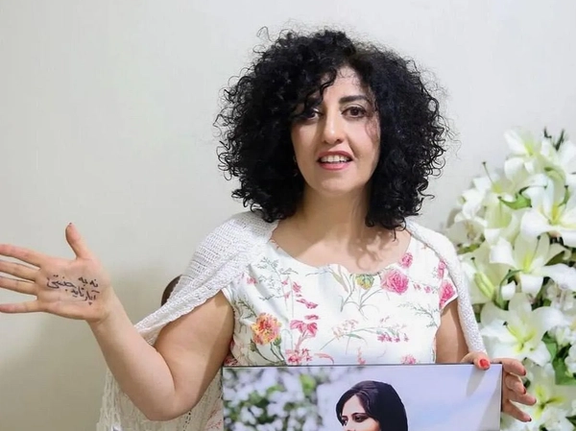
The Islamic Republic cannot be reformed and cannot offer democracy or freedom, Iranian Nobel Peace Prize laureate Narges Mohammadi told the French weekly magazine Nouvel Obs.

The Islamic Republic cannot be reformed and cannot offer democracy or freedom, Iranian Nobel Peace Prize laureate Narges Mohammadi told the French weekly magazine Nouvel Obs.
"People in Iran, based on historical experiences and decades of efforts now demand a transition from tyranny to democracy, meaning a shift away from the Islamic Republic," she said.
Mohammadi, who won the Nobel Prize in 2023, is currently on temporary leave from prison.
In her interview featured on the cover of a Nouvel Obs special edition on Iran, she described the government in Tehran as unaccountable and inefficient, asserting that its downfall is inescapable and what Iranians want.
"The transition from the Islamic Republic is aimed at creating a democratic and secular structure where human rights and women's rights are guaranteed, and civil society is realized and strengthened," she said.
Mohammadi, 52, has spent much of the past 20 years in and out of prison. She has been arrested, tried, and sentenced to prison multiple times because of her human rights work.
Last December Mohammadi was released from Tehran's Evin prison to receive medical care where she was serving a 13-year sentence.
She was awarded the Nobel peace prize for her three-decade campaign for women's rights in Iran.
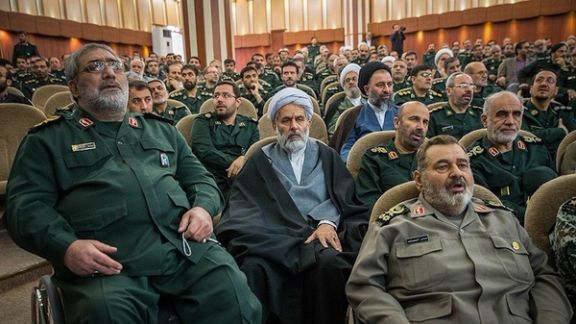
Two US lawmakers introduced a bipartisan bill urging the European Union to list Iran's Islamic Revolutionary Guard Corps a terrorist organization to present a united Western front against Tehran's military operations in the Middle East.
The Revolutionary Guards are a paramilitary and intelligence organization which helps arms and trains Shi'ite armed groups in the region.
US President Donald Trump designated the IRGC a terrorist organization in 2019 and ordered the assassination of its commander Qassem Soleimani in a drone strike in Baghdad the next year.
The European Union has so far held off on such a designation for the IRGC as a whole though it has designated individuals in the organization. None of the EU member states list it as a terrorist organization.
"To defeat the IRGC, which is responsible for sponsoring terrorist attacks against innocent civilians across the globe, the United States cannot act alone," congresswoman Claudia Tenney, a co-sponsor of the so-called Encouraging the EU to DESIGNATE Resolution, said in a statement.
"It's time for our EU allies to step up and follow suit .. this will send a strong message that the West is united against the IRGC's malicious actions and that we will hold them accountable for their vile acts of terrorism," the New York Republican added.
The EU has designated the Palestinian armed movement Hamas and the military wing of Lebanese Hezbollah terrorist organizations. Both groups, along with the Houthi group in Yemen and various militias in Iraq are backed by IRGC.
A full terrorism designation imposed on the IRGC would enable European law enforcement greater police and investigatory powers to prosecute Iranian officials and organizations.
The classification could also have profound dent European-Iran trade relations, as the IRGC controls a large portion of the Islamic Republic's economy.
“With Tehran more isolated than ever, now is the time to tighten the screws— we must not ease up or give the IRGC room to regroup," congressman Brad Schneider said.
"The US and Canada have already acted, and I urge our European allies to join us," the Illinois democrat said.
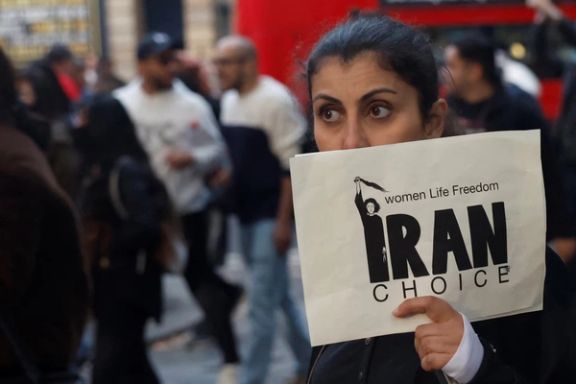
Iranian nationals were among the leading groups seeking asylum in the UK in 2024 and their number hit a new record, according to Home Office immigration data.
A total of 108,138 people claimed asylum, marking an 18% increase from the previous year and surpassing a record set in 2002.
Iranian nationals ranked third in asylum claims in the UK in 2024 with 8,099 claims. Pakistan had the highest number of claims with 10,542, followed by Afghanistan with 8,508.
A further analysis of the data suggests a notable increase in asylum applications from Iranians, particularly in 2022, with the highest surge occurring in Q4 of that year, with 3,686 applications.
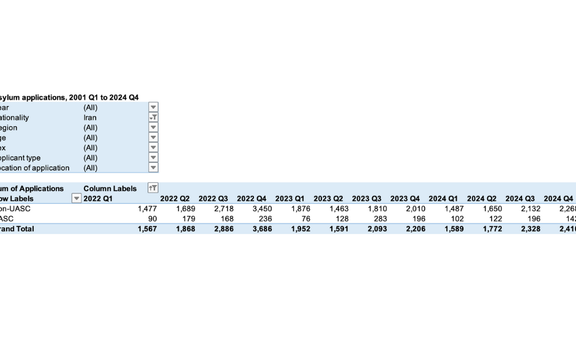
The spike likely may reflect growing migration pressures driven by the nationwide protests and state repression on demonstrations following the death in morality police custody of Mahsa Amini in September 2022.
The nationwide protest movement dubbed the Woman Life Freedom movement was met with increasingly violent government crackdowns, prompting many Iranians to seek asylum abroad.
During the protests, security forces killed at least 550 protesters, including children, and imprisoned over 20,000 people.
From Q1 2023 onwards, while there was some fluctuation but asylum applications remained relatively high at consistently above 1,500 per quarter for non-unaccompanied asylum-seeking children (UASC) and over 100 for UASC.
The continued upward trend through Q3 and Q4 of 2024 shows sustained asylum-seeking activity, though the surge in Q4 2022 remains the most significant increase in recent years.
However, despite the rise in applications, the number of decisions granting protection has not kept pace. Of 3,686 applications made by Iranians in Q2 2024, only 1,324 were granted protection.
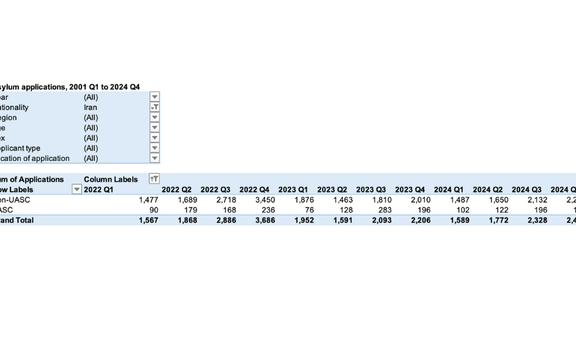
The highest number of grants occurred in Q3 of 2023, when 4,647 Iranians were granted protection.
This disparity between grants of protection compared to applications suggests the lengthy immigration processing times are contributing to a backlog.
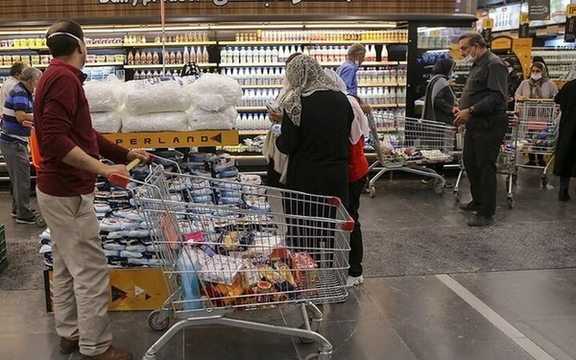
Fifteen key household items had increased in price by an average of 12% in just one month, a recent analysis by Iran International found, exposing a stark gap between official inflation figures and the reality faced by consumers.
Despite government statistics indicating a food inflation rate of 26.6% and an overall inflation rate of 32%, supermarket prices have risen far beyond these numbers, leaving many Iranians struggling to afford basic goods.
Supermarket prices have surged beyond what official reports indicate, leaving many citizens once considered middle class struggling to maintain their previous standard of living.
“We have stopped buying many things we used to consider normal, like nuts or even good quality rice,” said Mansour, 52, a resident of Tehran, who used to work in the banking sector but now finds his salary insufficient. “My children don’t understand why we’ve cut back so much.”
The economic crisis, which was once felt primarily by low-income families, has now engulfed middle-class households as well.
The Iranian rial has depreciated by more than 50% since September, falling to approximately 940,000 rials per US dollar. The collapse, combined with persistently high inflation—averaging around 40% annually over the past five years—has left many struggling to afford basic needs.
Official numbers versus market reality
Iran’s Ministry of Labor bases annual salary increases on official inflation figures, but market prices have consistently outpaced these statistics. A recent analysis by Iran International found that 15 key household items had increased in price by an average of 12% in just one month.
After cooking oil prices soared in December and potatoes became significantly more expensive in January, February has seen a sharp rise in the cost of legumes—some doubling in price within two weeks.
A survey of grocery prices in major cities, including Tehran, Mashhad, Isfahan, and Tabriz, found that household consumption costs had risen between 22% and 360% in the past week, with an average increase of 150%.
A 500-gram pack of tea, which cost 2 million rials ($2.13) last year, is now 4.6 million rials ($4.89).
Dairy products have also seen sharp increases. While official statistics report a 24% year-on-year inflation rate, market prices suggest much higher hikes.
A bucket of yogurt, which was 500,000 rials ($0.53) last year, now costs 760,000 rials ($0.81)—a 52% increase.
A 24-pack of toilet paper, once priced at 1.78 million rials ($1.89), now costs 3.93 million rials ($4.18), marking a 121% surge.
Families' statements about the price of various types of powdered milk also show that in February this year, the price of this essential product for infants has increased by 150 to 200 percent compared to the same time last year.
Rent and housing costs keep soaring
Inflation has also made housing less affordable. The Statistical Center of Iran reported a 37.6% increase in rent prices last month, but a nationwide survey by Iran International suggests that rents have risen by an average of nearly 78% over the past year. Many tenants have been forced to downsize or move to less expensive areas.
A resident of Tehran’s Yousef Abad neighborhood, who previously paid 240 million rials ($260) per month in rent, had to move to a smaller apartment due to rising costs. “I now pay 400 million rials ($430) a month for a place that is 10 square meters smaller,” he said.
While low-income citizens have long struggled with inflation, the economic crisis has now eroded the financial security of middle-class families. Many have reduced their spending on non-essential goods, and in some cases, even food quality has suffered.
With average monthly incomes now at just $120, while basic living costs exceed $500, over 30% of the population has fallen below the poverty line.
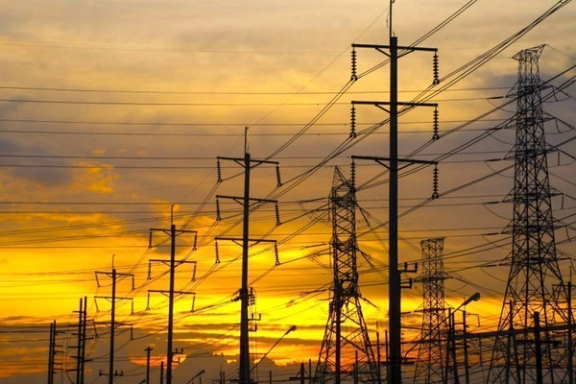
Iranian President acknowledged public frustration over widespread blackouts and energy shortages, saying his government had become ashamed over its inability to deal with the issue.
“This year, we let the dear people of Iran down and were forced to cut their electricity. At times, we also had to cut off electricity and gas to producers because of inefficient consumption,” Masoud Pezeshkian said on Thursday, calling for reduced reliance on foreign energy sources.
“The process we went through this year was by no means acceptable, and we must strive to move out of this situation next year.”
But power cuts are just one symptom of a worsening economic crisis. Government offices, banks, and schools in most of Iran’s 31 provinces have been closed for almost 12 days in the past month due to severe energy shortages.
With Iran already observing 28 official holidays per year, such additional shutdowns have paralyzed public services. The IRGC-affiliated Tasnim News Agency reported that school closures alone cost the country "10,000 billion rials per day" (over $10 million) and have significantly impacted student learning.
A teacher described the consequences to Shargh daily: “On the one hand, our income is cut with every closure since, unlike other teachers, we do not have fixed salaries. If it snows one day and schools are closed, we do not receive that day’s salary. Now, look at how many closures we’ve had this year.”
The country’s economic crisis runs deeper. Inflation reached 32% for the 12 months leading up to February 2025, according to the Iranian Statistics Center.
Over the past five years, annual inflation has hovered around 40%. The Iranian currency, the rial, has depreciated by more than 50% since September while the US has reinstated it “maximum pressure” policy on Iran over its nuclear ambitions while the Iranian Supreme Leader still calling the negotiations with the US unwise.
With the currency in freefall, the average monthly income has dropped from nearly $200 to just $120, while basic living expenses require at least $500. As a result, over 30% of Iranians now live below the poverty line.
Officials argue that raising wages would drive inflation higher, but labor relations expert Fatemeh Azizkhani dismissed this idea.
“Even if they increase wages by 100%, it will only cover part of the needs of working families,” she told Event 24, warning that failing to adjust salaries for inflation would push workers into critical conditions, over one third of Iranians now living below the poverty line in the worst crisis since the founding of the Islamic Republic.
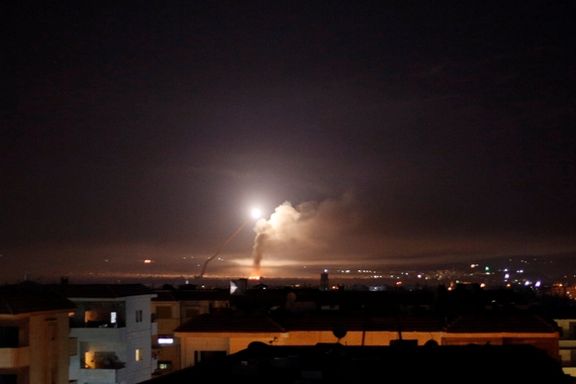
Iran's Foreign Ministry on Thursday condemned recent Israeli air and ground attacks on southern Syria and the Damascus suburbs, urging a response from the international community and Islamic nations.
On Thursday, spokesperson Esmail Baghaei denounced the strikes as a clear violation of the UN Charter and international law, citing repeated breaches of the 1974 agreement.
He also called on the UN Security Council to take immediate action to halt what he described as Israel's aggression.
"Israel’s occupation of parts of Syria’s territory and repeated violation of the Arab country’s sovereignty and territorial integrity are tantamount to an act of aggression," he said.
The 1974 Agreement on Disengagement between Israel and Syria, establishing a UN-monitored ceasefire and buffer zone, explicitly stated it was not a peace treaty but a step towards one.
However, following the instability caused by the Syrian civil war and the fall of Bashar Assad’s government, Israel declared the agreement void, leading to increased military activity, including an invasion of the buffer zone and aerial campaigns targeting Syrian military capabilities in December 2024.
On Wednesday, Israeli armed forces launched airstrikes at military sites in southern Syria, following Prime Minister Netanyahu's demand for the "complete demilitarization" of the region.
Residents reported low-flying planes over Damascus before the strikes, which a local monitoring group said targeted sites in Daraa province, including an airport previously hit by Israel. Syrian media also reported a strike near al-Kiswah.
Israel has carried out hundreds of strikes in Syria since 2011, aiming to disrupt Iran's use of the country as a conduit for smuggling supplies to its regional proxies, including Hezbollah.